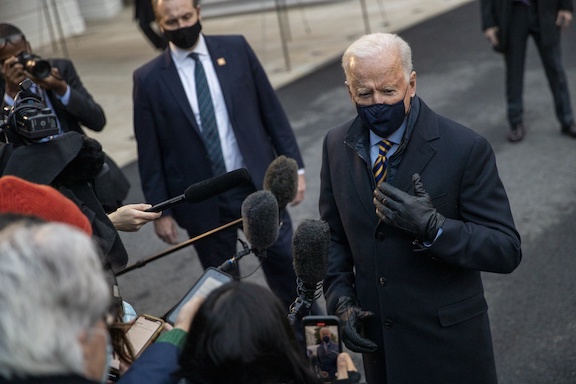Biden picks up where Trump left off in hard-line stances at WTO
President Joe Biden’s administration dashed hopes for a softer approach to the World Trade Organization by pursuing a pair of his predecessor’s strategies that critics say risk undermining the international trading system.
The U.S. delegation to the WTO, in a statement Monday obtained by Bloomberg, backed the Trump administration’s decision to label Hong Kong exports as “Made in China” and said the WTO had no right to mediate the matter because the organization’s rules permit countries to take any action to protect their “essential security interests.”

“The situation with respect to Hong Kong, China, constitutes a threat to the national security of the United States,” the U.S. delegation said. “Issues of national security are not matters appropriate for adjudication in the WTO dispute-settlement system.”
Prior to 2016, WTO members generally steered clear of defending their trade actions on the basis of national security because doing so could encourage other nations to pursue protectionist policies that have little or nothing to do with hostile threats.
Steel Tariffs
That changed in 2018, when the Trump administration triggered a cold war-era law to justify tariffs on foreign imports of steel and aluminum. In response, a handful of U.S. trade partners, including Canada, the EU, and China filed disputes at the WTO and a ruling in those cases is expected later this year.
Since then, more nations—including Saudi Arabia, India, Russia and others—have cited the WTO’s national-security exemption in regional trade fights, leading trade experts to warn that such cases could erode the organization’s ability to mediate disputes.
The Biden administration on Monday said the U.S. has consistently argued that national-security disputes are not subject to WTO review because it would infringe on a member’s right to determine what is in its own security interests.
In spite of the U.S. objection, the WTO granted Hong Kong’s dispute inquiry and will establish a panel of experts to deliberate the matter and render a decision, which could take two to three years.
Appellate-Body Paralysis
At the same meeting, the Biden administration said it would not agree to appoint new members to the WTO’s appellate body, a seven-member panel of experts who until 2019 had the final say on trade disputes involving billions of dollars worth of international commerce.
The Biden administration said it could not do so because the U.S. “continues to have systemic concerns” with the functioning of the appellate body as have all previous administrations over the past 16 years.
Though the statement was not entirely unexpected, it confirms America’s bipartisan frustration with the functioning of the WTO appellate body and the new administration’s willingness to block new panelists until changes can be agreed.
Once Katherine Tai is confirmed as the U.S. Trade Representative, her office “looks forward to working with” WTO Director-General Ngozi Okonjo-Iweala to tackle the problems with WTO dispute settlement, including the unresolved issues over appellate-body overreach, USTR spokesman Adam Hodge said in an email. “These are long-standing, bipartisan concerns that we hope our trading partners will work with us to address,” he said.
The Trump administration broke precedent when it refused to consider any nominees to fill vacancies on the panel until there weren’t enough to sign off on new rulings. As a result, the WTO’s dispute-settlement system has been critically damaged because WTO members are now free to veto any adverse dispute rulings by appealing them into a legal void created by the appellate body’s paralysis.
Similar Stories

December 2024 U.S. Transportation Sector Unemployment (4.3%) Was the Same As the December 2023 Level (4.3%) And Above the Pre-Pandemic December 2019 Level (2.8%)
View ArticleDP World appoints Jason Haith as Vice President of Freight Forwarding for U.S. and Mexico
DP World, a global leader in logistics and supply chain solutions, has announced the appointment of Jason Haith as Vice President, Commercial Freight Forwarding – U.S. and Mexico, effective immediately.…
View Article
Amaero secures final approval for $23.5M loan from Export-Import Bank
View ArticleU.S. Bureau of Labor Statistics employment situation
Total nonfarm payroll employment increased by 256,000 in December, and the unemployment rate changed little at 4.1 percent, the U.S. Bureau of Labor Statistics reported today. Employment trended up in…
View ArticleImport Cargo to remain elevated in January
A potential strike at East Coast and Gulf Coast ports has been avoided with the announcement of a tentative labor agreement, but the nation’s major container ports have already seen…
View ArticleS&P Global: 2025 U.S. transportation infrastructure sector should see generally steady demand and growth
S&P Global Ratings today said it expects activity in the U.S. transportation sector will continue to normalize in 2025, with growth rates for most modes of transportation slowing to levels…
View ArticleGet the most up-to-date trending news!
SubscribeIndustry updates and weekly newsletter direct to your inbox!





